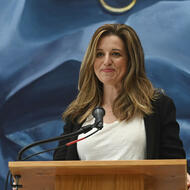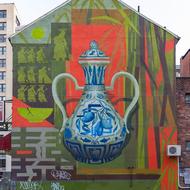Un-monument | Re-monument | De-monument
This multi-year program, funded by a $3 million grant from the Mellon Foundation, is bringing temporary monuments and free programming to the city.
What is a monument? Who do we choose to memorialize? How can our public spaces reflect what is important to us?
Building toward Boston’s 250th anniversary, we're collaborating with artists, local cultural organizations, and community members to create new public art projects that expand the inclusive histories represented in public spaces across the City.
“Un-monument | Re-monument | De-monument: Transforming Boston” is bringing temporary monuments and free public programming to neighborhoods across Boston.
This multi-year program, which began in 2024, enables artists to promote a far more engaged, reflective, creative, and active relationship with the city’s landscape and built environment.
Temporary Monuments
We’re commissioning artworks from groundbreaking artists and partnering with celebrated local arts organizations.
The Un-monument initiative includes six curatorial approaches to commissioning temporary monuments across the City. Some Un-monument temporary monuments were selected through an open call to artists led by the Mayor’s Office of Arts and Culture. Others are the result of direct commissions by five organizations serving as curatorial partners:
- Boston Public Art Triennial
- Emerson Contemporary
- National Center of Afro-American Artists
- North American Indian Center of Boston
- Pao Arts Center
With multiple curators, we hope to create opportunities for more perspectives to join the conversation. Commissioning local organizations also supports Boston’s creative ecosystem and creates a more natural distribution of projects, histories, and community participation in this city-wide dialogue.
Below, learn more about the temporary monument projects.
2024 Temporary Monuments
2025 Temporary Monuments
Through this call to artists, we also selected eight research and development projects to support through the Un-monument program.
Research and Development Projects
Upcoming Events
EventsCalendar
Public Conversations
Our series of free conversations at The Embrace explores the interconnections between monuments, public memory, and daily lives.
In summer 2024, in collaboration with The Hutchins Center for African and African American Research at Harvard University, City of Boston Parks and Recreation, Embrace Boston, and Friends of the Public Garden, we held a series of public discussions featuring leading academics, poets, and historians. We are excited to return to The Embrace this summer for the second year of this series!
Our goal is to invigorate public space by bringing rich conversations into the broader public, using The Embrace and the Kings' legacy as inspiration. Together, we can create a space for broader expressions of the powerful diversity and complexity of American stories.
Following the public conversations, we host free dinner receptions facilitated by local artists and cultural leaders in relaxed settings to continue the conversation and deepen public engagement.
Below, take a look back at the 2024 public conversations. (Photos by Malakhai Pearson)
POETRY, PUBLIC ART, AND THE POLITICS OF MEMORY
Wednesday, July 31
This discussion was hosted by Professor Brandon Terry and featured Professor Joshua Bennett and Professor Imani Perry.
Poetry, especially since the great age of epic poetry, has been a profoundly important technology of communal memory and stories of peoplehood all around the globe. Our first event looked to this legacy and its present-day importance with Joshua Bennett, one of the country’s most celebrated poet-scholars, and Imani Perry, one of our nation’s most prominent public intellectuals, as they engaged in a public conversation about the art and politics of memory.
Backdropped by The Embrace, Boston’s most talked-about work of public art in decades, these two extraordinary thinkers reflected on hard questions about who and what we remember, the form and function of civic memory, and the ways that art may be able to facilitate a more inclusive and insightful practice of imagination.
We learned together about the nature of collective and civic memories and the different forms that human beings have experimented with to pass them down through generations.
BLACK LIVES, BLACK STORIES, OUR HISTORY: THE AFRICAN DIASPORA AND NEW ENGLAND
Wednesday, August 21
This discussion was hosted by Kyera Singleton and featured Professor Kerri Greenidge and Professor Kendra T. Field.
During this electrifying public conversation at Boston Common, Tufts University historians Kerri Greenidge and Kendra T. Field delved into the untold histories of the African Diaspora in New England. Moderated by Kyera Singleton, the dynamic director of the Royall House and Slave Quarters, this event illuminated the rich and often overlooked narratives that have shaped the region.
Greenidge and Fields, both renowned for their pathbreaking work on abolitionism, the early civil rights movement, family history, popular memory, and the profound impact of slavery in New England, introduced innovative public scholarship that challenged and expanded our understanding of the past. This engaging panel sparked dialogue and offered fresh perspectives on the enduring legacy of Black history in New England. This event provided an opportunity to engage with groundbreaking historians who are redefining our understanding of the region’s history.
THE FUTURE OF AMERICAN DEMOCRACY
Monday, September 30
This discussion was hosted by Professor Brandon Terry and featured Professor Michael J. Sandel.
This compelling and timely public conversation reflected on the pressing challenges facing America’s democratic institutions and traditions today.
Michael Sandel, a Harvard political philosopher celebrated for his accessible and thought-provoking explorations of justice, ethics, and democracy, is the author of influential works like Democracy’s Discontent and The Tyranny of Merit. His work encourages us to reflect on the moral dimensions of political and civic life, asking fundamental questions about fairness, equality, and the common good.
This conversation responded to the pivotal moment when many Americans were feeling that the country’s democratic institutions and traditions were under threat. From growing political polarization to rising concerns about voter rights, civic trust, fairness, and governmental accountability, the future of American democracy appeared uncertain. Together, these two scholars brought clarity, urgency, and hope to a conversation that couldn’t have been more timely or essential.
Community Engagement
Continuing the Conversation
At our 2024 public conversations, we worked with Payal Kumar, an engagement consultant, to develop strategies that would encourage continued dialogue among attendees following each talk. Below, read some reflections from community members about monuments, public art, democracy, and culture.
Advisory Team
As part of this program, the Mayor’s Office of Arts & Culture assembled an advisory team that provides thought partnership, weighs in on community engagement strategies, offers critical feedback, and more throughout the duration of the program.
The Un-monument Advisory Team is made up of business owners, academics, activists, non-profit organization directors, school leaders, educators, and artists from across the city.
Education and Interpretation
In addition to public art and public conversations, Un-monument is deepening its impact through partnerships with the Boston Art Review, which is producing expanded research and writing about Boston’s commemorative landscape; and PRX, which is recording and preserving oral histories connected to public memory and creating a podcast. Together, these initiatives ensure that Un-monument engages audiences across generations, geographies, and disciplines as Boston reimagines its public spaces.
News
NewsBackground
This programming is made possible by a grant from the Mellon Foundation's Monuments Project. Our deepest gratitude to the Mellon Foundation and all of our partners for their support of this program.













